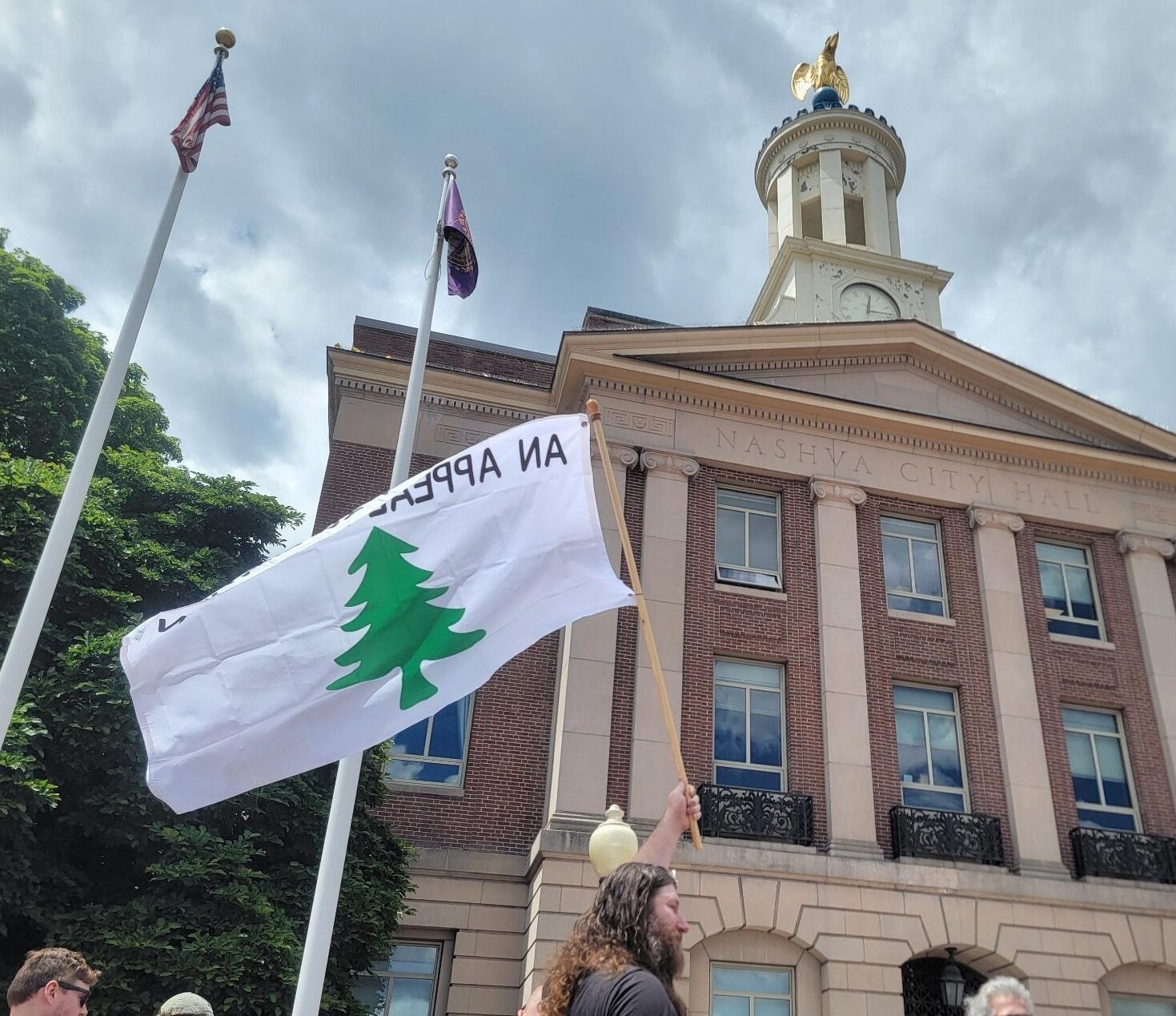Nashua Slapped With Lawsuit After Banning Pine Tree Flag

Appealing to Heaven may not be feasible in a First Amendment dispute, but a federal lawsuit could work.
A Nashua official’s decision to ban the historic Pine Tree flag from outside City Hall this summer is landing Mayor Jim Donchess’ administration in court. Attorneys with the Institute for Free Speech say the city’s abuse of its flagpole policy violates the First Amendment.
“Nashua’s flag policy gives city officials unbridled discretion to censor speech they dislike,” said Institute for Free Speech Attorney Nathan Ristuccia. “The First Amendment doesn’t permit the government to turn a longstanding public forum into a personal billboard for city officials’ preferred views. The Supreme Court has warned against exactly this abuse.”
The Institute for Free Speech is representing Nashua resident Beth Scaer in the lawsuit filed in the United States District Court in Concord. Scaer applied to fly a Pine Tree flag from the city’s flagpole in June, but was denied.
“It’s disturbing that Nashua officials can arbitrarily silence voices they disagree with,” Scaer said. “The Pine Tree Flag represents an important part of our local history, yet the city wouldn’t allow it to fly because it’s somehow not ‘in harmony’ with their message. But this isn’t about one flag—it’s about protecting everyone’s right to free speech.”
The complaint points out that the city maintains a “Citizen Flag Pole” in front of city hall for people “to fly a flag in support of cultural heritage, [to] observe an anniversary, honor a special accomplishment, or support a worthy cause.” Those causes have included Pride Month, Indian Independence Day, Brazilian Independence Day, Greek Independence Day, International Francophonie Day, and the anniversary of the founding of Nashua’s Lions Club, according to court records.
Scaer herself used the flagpole to fly flags celebrating Martin Luther, Women’s Suffrage, and Christianity. But she started running into trouble in 2020 when her flag with the message “Save Women’s Sports” was removed after one day when City Councilor Jan Schmidt complained.
At the time of the 2020 incident, Nashua had no written policy on flag approval. But a 2022 U.S. Supreme Court ruling concerning a citizen’s flag controversy in Boston prompted Nashua to draft one.
The Nashua policy states, “This potential use of a City flag pole is not intended to serve as a forum for free expression by the public. Any message sought to be permitted will be allowed only if it is in harmony with city policies and messages that the city wishes to express and endorse.”
The Institute for Free Speech says that’s not good enough. The net effect is viewpoint censorship, says Mat Staver, founder and chairman of the nonprofit, pro-faith legal group Liberty Counsel. He should know. His organization filed the lawsuit that resulted in the Supreme Court ruling Nashua is accused of violating.
When the City of Boston banned conservative activist Hal Shurtleff from flying the Christian flag, with its white banner and red cross on a blue field, at Boston City Hall in 2017, Staver and Liberty Counsel took the city to court. They eventually won a $2.1 million award and set a legal standard at the U.S. Supreme Court he says Nashua is now failing.
“They’re clearly violating the citizens’ right to free speech, and if they don’t reverse themselves they are subject to a lawsuit. It will be expensive for the city,” Staver told NHJournal.
Scaer’s February application to fly a flag supporting people who detransition after a sex change procedure was denied this year as it was deemed “not in harmony with the message that the City wishes to express and endorse.”
Undeterred, Scaer sought permission to fly a Pine Tree flag around the anniversary of the Battle of Bunker Hill, in part to honor Granite Staters who fought in the battle. A version of the Pine Tree flag is believed to have flown at that battle.
In particular, Scaer wanted to fly what is known as the “Appeal to Heaven” flag, featuring that phrase (from philosopher John Locke) and a pine tree. The pine tree is also a reference to the 1772 Pine Tree Riot, which took place in Weare, N.H., and is widely viewed as one of the first skirmishes in the American Revolution.
But city officials denied the request, stating the flag celebrating Revolutionary War patriots was also not in harmony with the Donchess administration’s vision. The city did not explain why it found the flag objectionable.
The Pine Tree flag made news earlier this year when it was reported conservative U.S. Supreme Court Justice Samuel Alito flew it at his New Jersey vacation home. The flag was also brandished by a handful of people in the violent mob that attacked the U.S. Capitol on Jan. 6, 2021. The prevailing media narrative then linked Alito to the flag and to the Jan. 6 attack, with barely a mention of the flag’s true origin.
NOTE: An earlier version of this story mistakenly reported Liberty Counsel attempted to fly the Christian Flag in Boston. It was Hal Shurtleff and Camp Constitution, who were later represented by Liberty Counsel. NHJournal regrets the error.



